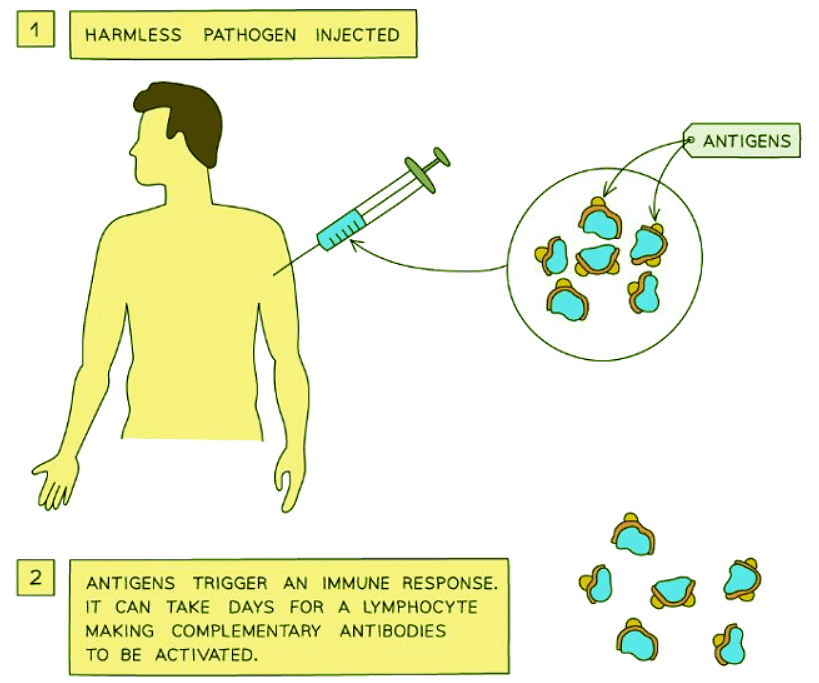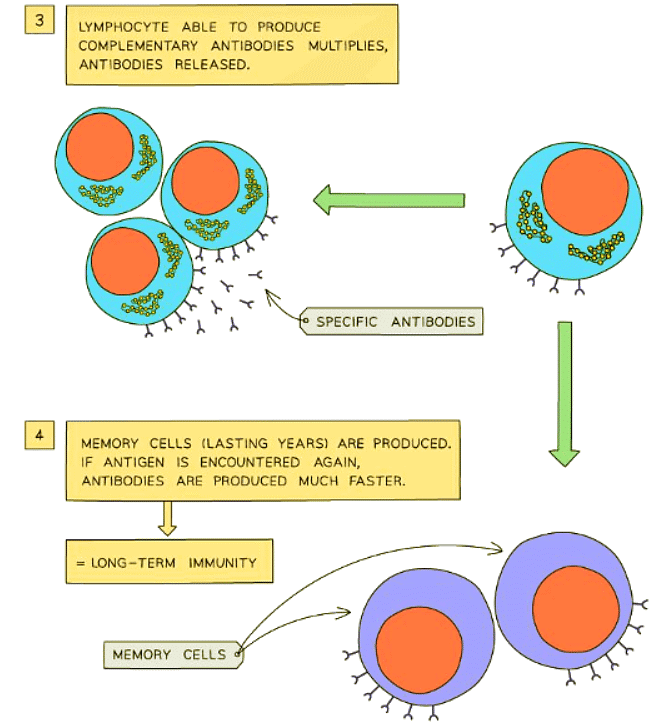Class 10 Exam > Class 10 Notes > Biology for GCSE/IGCSE > Vaccination
Vaccination | Biology for GCSE/IGCSE - Class 10 PDF Download
Vaccination: Extended
- Vaccinations provide protection against specific diseases and enhance the body's immune response to pathogens, negating the need for exposure to potentially deadly diseases.
- The effectiveness of vaccination in a population hinges on the percentage of individuals who are vaccinated.
- Vaccines introduce a deactivated or altered form of the disease-causing pathogen, containing specific antigens, into the body.
- While in this weakened state, the pathogen is incapable of causing illness but can trigger an immune reaction.
- Lymphocytes generate antibodies that precisely match the introduced antigens.
- These antibodies bind to the antigen, forming memory cells in the process.
- The memory cells persist in the bloodstream, ready to mount a rapid response if the antigen is encountered again through infection by a live pathogen.
- Due to the production of memory cells, this immunity is enduring.
Vaccination
Vaccination is a crucial method to develop immunity against various diseases. It involves the administration of a vaccine to stimulate the body's immune system to recognize and fight specific pathogens. Here are key points to understand about vaccination:
- Vaccination stimulates the immune system by exposing it to a harmless form of a pathogen or a part of it.
- It triggers the production of antibodies that recognize and target the pathogen, providing immunity upon future exposure.
- Vaccines can contain weakened or inactivated forms of pathogens, ensuring they do not cause the disease.
- Herd immunity is achieved when a significant portion of the population is vaccinated, reducing the spread of diseases.
Importance of Vaccination
- Vaccination protects individuals from serious illnesses and complications associated with infectious diseases.
- It plays a vital role in eradicating diseases like smallpox and controlling outbreaks of diseases such as measles.
Vaccine Types
- Live attenuated vaccines contain weakened forms of pathogens.
- Inactivated vaccines use killed pathogens to stimulate an immune response.
- Subunit, recombinant, and conjugate vaccines focus on specific parts of pathogens to trigger immunity.
- Toxoid vaccines target toxins produced by bacteria rather than the bacteria itself.
Vaccination Schedule
- Children typically receive vaccines at specific ages to ensure protection from various diseases.
- Adults may require booster doses to maintain immunity against certain diseases.

 Vaccination
Vaccination
Question for VaccinationTry yourself: What is the purpose of vaccination?View Solution
The document Vaccination | Biology for GCSE/IGCSE - Class 10 is a part of the Class 10 Course Biology for GCSE/IGCSE.
All you need of Class 10 at this link: Class 10
|
101 videos|193 docs|33 tests
|
FAQs on Vaccination - Biology for GCSE/IGCSE - Class 10
| 1. How do vaccines work to protect against diseases? |  |
Ans. Vaccines work by introducing a weakened or inactive form of a pathogen into the body, triggering the immune system to produce antibodies. These antibodies remember the pathogen, so if the body is exposed to the real pathogen in the future, it can quickly recognize and fight it off.
| 2. Are vaccines safe to use? |  |
Ans. Yes, vaccines are rigorously tested for safety before being approved for use. The benefits of vaccination in preventing serious diseases far outweigh the risks of potential side effects, which are usually mild and temporary.
| 3. How long does immunity from a vaccine last? |  |
Ans. The duration of immunity from a vaccine can vary depending on the specific vaccine and individual. Some vaccines provide lifelong immunity, while others may require booster shots to maintain protection over time.
| 4. Can vaccines cause the diseases they are meant to prevent? |  |
Ans. No, vaccines cannot cause the diseases they are designed to prevent. The vaccines contain either weakened or inactivated pathogens that cannot cause the disease itself, but instead stimulate the immune system to produce protection against future infections.
| 5. Do vaccines have any side effects? |  |
Ans. Like any medication, vaccines can have side effects, but the majority are mild and temporary, such as soreness at the injection site or a low-grade fever. Serious side effects are extremely rare and the benefits of vaccination far outweigh the risks.
Related Searches















